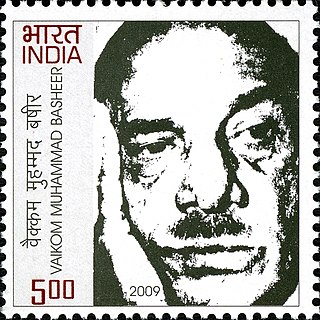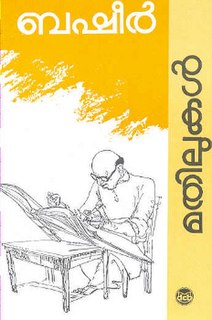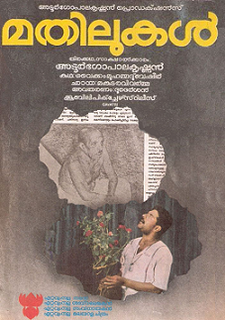
VaikomMuhammad Basheer was a writer of Malayalam literature. He was a writer, humanist, freedom fighter, novelist and short story writer, noted for his path-breaking, down-to-earth style of writing that made him equally popular among literary critics as well as the common man. He was popularly referred to as Beypore Sulthan. His notable works include Balyakalasakhi, Shabdangal, Pathummayude Aadu, Ntuppuppakkoranendarnnu, Mathilukal, Janmadinam and Anargha Nimisham and the translations of his works into other languages have earned him worldwide acclaim. The Government of India awarded him the fourth highest civilian honor of the Padma Shri in 1982. He was also a recipient of the Sahitya Academy Fellowship, Kerala Sahitya Academy Fellowship, and the Kerala State Film Award for Best Story. He was a recipient of the Vallathol Award in 1993.
Ann-Al-Haqq is a short story based on the life of the Sufi Mansur Al-Hallaj, who was indicted and killed on charges of heresy. It is part of the collection Anargha Nimisham, written by Vaikom Muhammad Basheer in typical Khalil Gibran style,

Mathilukal is a Malayalam novel written by Vaikom Muhammad Basheer in 1965. It is one of the most cherished and well-known love stories in Malayalam. Its hero, Basheer himself, and heroine, Narayani, never meet, yet they love each other passionately. Despite being imprisoned and separated by a huge wall that divides their prisons, the two romance each other.
Nileena Abraham is a writer and translator from Kerala, India. She was born in Pabna. After earning master's degrees in Bengali language, political science and history, she moved to Kerala and worked as a professor of Bengali at Maharaja's College, Ernakulam and as the Dr. Suniti Kumar Chatterji Professor of Bengali at International School of Dravidian Linguistics, Thiruvananthapuram.

Bhargavi Nilayam is a 1964 Indian Malayalam-language romantic horror film directed by A. Vincent and written by Vaikom Muhammad Basheer based on his own short story Neela Velicham. The film stars Madhu, Vijaya Nirmala, Prem Nazir and P. J. Antony.
Balyakalasakhi is a 1967 Malayalam film, directed by J. Sasikumar. It is an adaptation of Vaikom Muhammad Basheer's famous novel of the same name. Basheer himself wrote the screenplay and dialogues. Balyakalasakhi and Bhargavi Nilayam (1964) are the only films for which Basheer has written the screenplay. The film's story revolves around Majeed and Suhra, who have been in love with each other from childhood.
Viddikalude Swargam is a Malayalam short story collection by Vaikom Muhammad Basheer published in 1948. The book is one of the best acknowledged works of Basheer and is considered a modern classic in Malayalam.

Mathilukal (transl. Walls) is a 1990 Indian Malayalam-language film written, directed and produced by Adoor Gopalakrishnan based on the autobiographical novel of the same name by Vaikom Muhammad Basheer. The film focuses on the prison life of Vaikom Muhammad Basheer and the love between him and Narayani, a female inmate of the prison, who remains unseen throughout the film. Mammootty plays the role of Vaikom Muhammad Basheer while K. P. A. C. Lalitha gives voice to Narayani. The film was screened at the Venice Film Festival. it won four awards at the National Film Awards in 1990 making it the third Malayalam film to win 4 National awards after Swayamvaram (1972) and Oru Vadakkan Veeragatha (1989).
Mucheettukalikkarante Makal is a novel by Vaikom Muhammad Basheer published in 1951. Written in the colloquial tongue and filled with exceptional humour, the novel remains a best seller in Malayalam literature.
Ntuppuppakkoranendarnnu is a short novel by Vaikom Muhammad Basheer published in 1951. It is one of the most famous among his works. The story is woven around the love of Kunjupattumma for Nisar Ahmed. But the dominant character is Kunjupattumma's mother who gloats over the glory that was, and the central theme is the conflict between the value she upholds and those of the educated, forward-looking Nissar Ahmed. The story is filled with pleasant humour and anecdotes from Muslim religious lore.
Anuragathinte Dinangal is a book by Vaikom Muhammad Basheer published in 1983. The author himself has traced Anuragathinte Dinangal to the diary he had kept of a Hindu girl's love for him frustrated by the objection from her parents and Basheer's refusal to hurt them. The book was originally titled Kaamukante Diary but was changed later on the suggestion of author M. T. Vasudevan Nair.
"Ente Thankam" is a short story written by Vaikom Muhammad Basheer. It is his first published work. Originally published in the now-defunct newspaper Jayakesari in 1937, it was later published in the collection Vishappu under the name "Thankam". A path-breaker in Malayalam romantic fiction, it had its heroine a dark-complexioned hunchback.
Visappu (Hunger) is a collection of short stories by Vaikom Muhammad Basheer published in 1954. The collection includes Basheer's first story "Ente Thankam" which is titled "Thankam" in the book. This story originally appeared in the Ernakulam-based newspaper Jayakesari in the year 1937. The other stories include "Visappu" (Hunger), "Marunnu" (Medicine) and "Pishachu" (Devil). Visappu is considered as a modern classic in south Asian literature.
Ormayude Arakal is a collection of memoirs by Vaikom Muhammad Basheer originally serialised in Chandrika Weekly and published as a book by National Book Stall in 1973. It is a rambling, incomplete kind of autobiography by the noted Malayalam author. The book also includes Basheer's conversations with Sreedharan, B. M. Gafoor, P. K. Muhammad, M. A. Hakim, K. K. Amu, I. V. Sasi, and Punalur Rajan.
Maranathinte Nizhalil is a novel by Vaikom Muhammad Basheer published in 1951. In this novel, Basheer has not followed his usual style of humour and sarcasm. It is an isolated work because of the subjective presentation of some of the hard experiences of its hero, and its technique resembles more or less the 'stream of consciousness' method.
Cheviyorkkuka! Anthimakahalam is a book by Vaikom Muhammad Basheer published in 1992. The book includes the speech given by Basheer on the occasion of being conferred the Doctor of Letters by University of Calicut on 19 January 1987. It was the last book of Basheer published during his lifetime.
Kathabeejam is a one-act play written by Malayalam language author Vaikom Muhammad Basheer. The play was written by Basheer in a period of few weeks and was conceived for the 16th anniversary of Samastha Kerala Sahitya Parishath. It was published as a book in May 1945 and was Basheer's only play. The protagonist of the play is a writer named Sadasivan.
Ronald E. Asher is a British linguist and educator specialised in Dravidian languages. He is a fellow of Royal Asiatic Society of Great Britain and Ireland (1964), a fellow of the Royal Society of Edinburgh (1991), and an honorary fellow of the Sahitya Akademi.
Manthrikappoocha is a short novel by Vaikom Muhammad Basheer published in 1968. It is one of the most famous among his works. The story of this novel revolves around a cat came to basheer's house. Also events happened in his and neighbours house with this cat. The narration of the story is filled with pleasant humour and anecdotes from Muslim and Hindu religious lore.
Vishwavikhyathamaya Mookku is a short story written by Vaikom Muhammad Basheer and published in 1954 in an anthology of the same name. The story is a socio-political satire about an illiterate cook whose nose starts to grow from the day he turns 24. The nose is grown like an elephant's nose. The poor cook becomes rich in no time and starts to give opinions on international matters. The story expands on the shortcomings of this long nose of the ordinary man. By using this simple topic nose Basheer is exposing the social conduct through comedy. The story is regarded as a classic in Malayalam literature.



